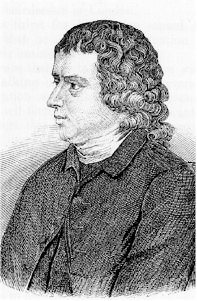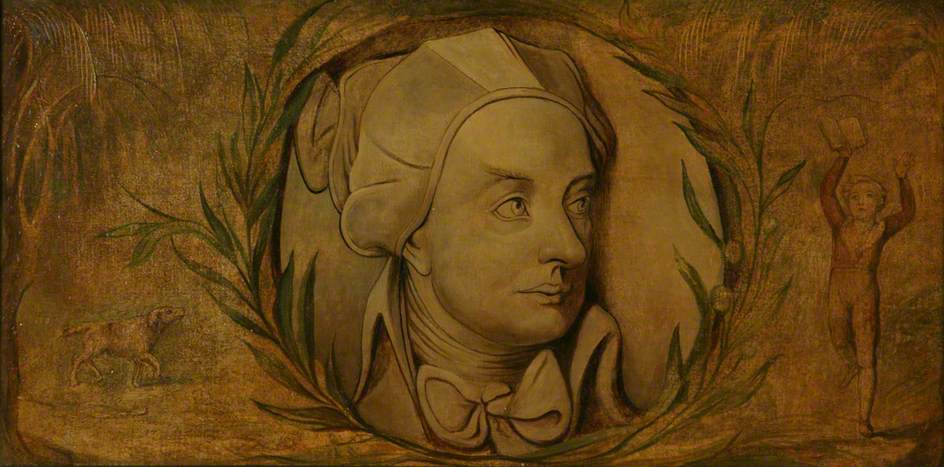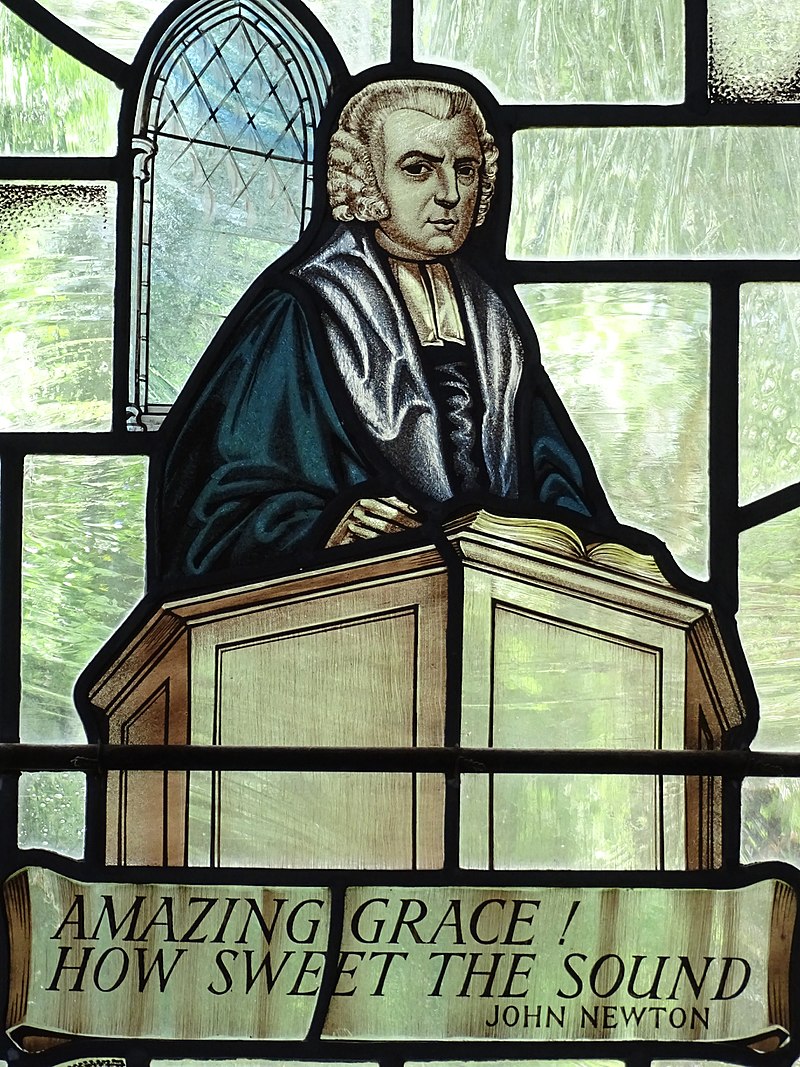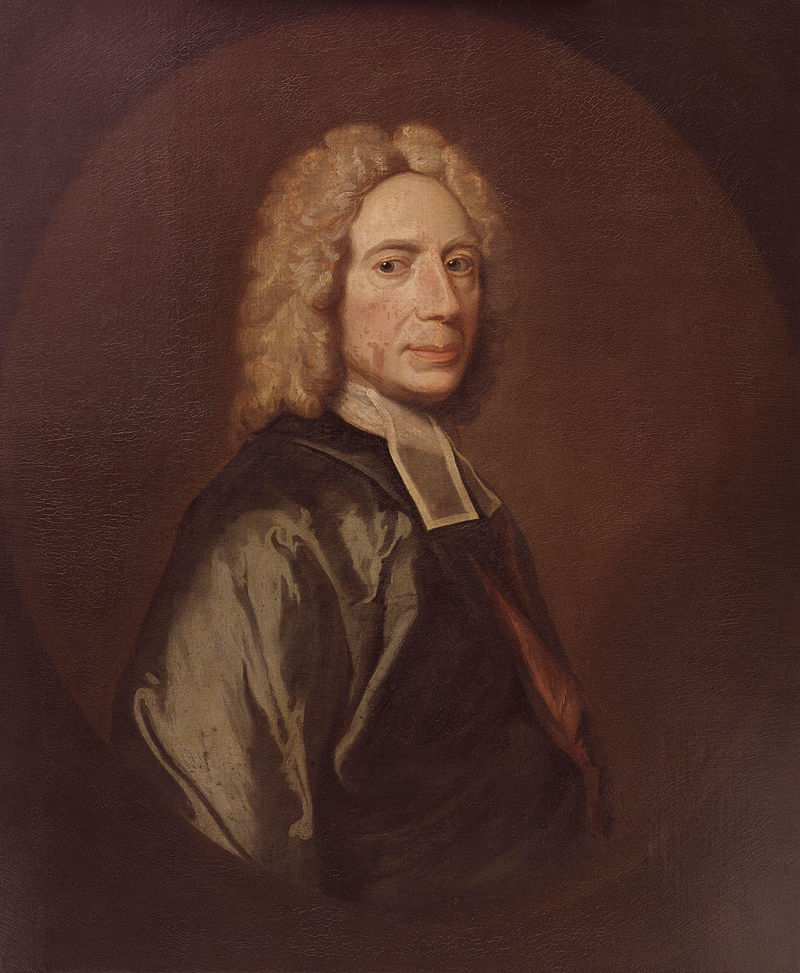|
At 22 years of age, Robert Robinson wrote the words to the hymn Come Thou Fount of Every Blessing; words which are still familiar today. Robinson was an English dissenter who, as well as writing hymns, spent his life researching and studying the antiquity and history of Christian Baptism.
Robert Robinson was born on 27th September 1735 in Swaffham, Norfolk. His father, Michael Robinson, died when the boy was only five years old and his mother, Mary, was cut off from the rest of her family who disapproved of her “lowly marriage”. Fortunately, Robinson’s uncle paid for his position at a school near Scarning, Dereham, under the tuition of Reverend Joseph Brett. Robinson remained at school until the age of 14 when he was sent to London as an apprentice hairdresser. Inspired by his religious schooling and his love of reading, Robinson regularly studied the Bible and writings by early Christian authors. From his studies, Robinson became convinced infant baptism was inefficient, especially in comparison to the baptism of adults who have chosen to believe in God and the teachings of Jesus. As a result, none of Robinson’s twelve children were baptised as infants. In 1752, Robinson heard the Calvinist cleric George Whitefield preach and was inspired to convert to Evangelical Methodism. He was subsequently invited to assist at the Calvinistic Methodist Norwich Tabernacle set up by James Wheatley in 1754 but left after a matter of weeks. Rejecting Methodism, Robinson established a new Congregational church in St Paul’s Parish, Norwich. This, however, did not satisfy his beliefs and values, so by 1759, he had moved again. Robinson settled at the Stone-Yard Baptist Chapel in Cambridge, now known as St Andrew’s Street Baptist Church. He began preaching there as a Lecturer and then, in 1762, as a Pastor. Two years later, a new chapel was built to hold his growing congregation, which numbered more than one thousand. It was Robinson’s life-long wish to meet the Separatist theologian Joseph Priestley and finally got his chance in June 1790. Robinson travelled to Priestley’s New Meeting Chapel in Birmingham where he preached two sermons on Sunday 6thJune. Robinson planned to stay in Birmingham for a few days, however, he never left, dying in his sleep in the early hours of Wednesday 9th June 1790 at the age of 54. Priestley conducted his funeral and he was buried in the Dissenters' Burial Ground in Birmingham. Robinson’s two known hymns are Come Thou Fount of Every Blessing and Mighty God, while angels bless Thee, both of which remain in our hymnbooks today. The former was written shortly after Robinson converted to Methodism. The lyrics of Come Thou Fount… are based on 1 Samuel 7:12 in which Samuel says, “Thus far the Lord has helped us.” Samuel had placed a stone between Mizpah and Shen and named it Ebenezer, which means “stone of help”. Some versions of the song contain the reference to the stone in the second verse: Sorrowing I shall be in spirit, Till released from flesh and sin, Yet from what I do inherit, Here Thy praises I'll begin; Here I raise my Ebenezer; Here by Thy great help I’ve come; And I hope, by Thy good pleasure, Safely to arrive at home.
2 Comments
It is Not EasyTo apologise for a wrong, To begin all over again, To forgive and forget, To control a bad temper, To keep a high standard, To remember that the sun will shine: But it is worth while. John Wesley's RuleDo all the good you can, By all the means you can, In all the ways you can, In all the places you can, At all the times you can, To all the people you can, As long as ever you can. The Mission by Patience StrongChrist came not to relieve us of every heavy load, But to make us stronger to take the uphill road. He came, not to protect us beneath His sheltered wings, But to give us courage to fight evil things. He came to wage a battle; the right against the wrong ... Not to make life easy - but to make men strong. George Dana Boardman says...Sow an act, reap a habit, Sow a habit, reap a character, Sow a character, reap a destiny! John Boyle O'Reilly muses...What is the real good? I asked in a musing mood. Order, said the Law Court; Knowledge, said the school; Truth, said the wise man; Pleasure, said the fool; Love, said the maiden; Beauty, said the page; Freedom, said the dreamer; Home; said the sage; Fame; said the soldier; Equity, the seer; Spake my heart full sadly: The answer is not here. Then within my bosom Softly this I heard: Each heart holds the secret; Kindness is the word. "'Tis not the dying for a faith that is so difficult ... 'tis the living up to it that is difficult."
William Makepeace Thackeray “I would rather be able to appreciate things I cannot have than to have things I am not able to appreciate.” Elbert Hubbard "What seems to me to grow fairer as life goes by is the love and grace and tenderness of it; not it's wit and cleverness and grandeur of knowledge (grand as knowledge is) but just the laughter of little children and the friendship of friends; the cosy talk by the fireside; the sight of flowers and the sound of music." John Richard Green “God moves in a mysterious way.” The English poet and hymnodist William Cowper coined this adage in his poem Light Shining out of Darkness in 1773. Now known as God Moves in a Mysterious Way, the poem is sung as a hymn in many Christian churches. Cowper was an associate of John Newton (see previous article) and wrote poems in support of the Abolitionist campaign. He also wrote several famous hymns.
Cowper was born in Berkhamsted, Hertfordshire on 26th November 1731. His father John was rector of the Church of St Peter and his mother, Ann, sadly passed away after giving birth to his younger brother. The death of Cowper’s mother greatly affected the young boy and she became the subject of his poem On the Receipt of My Mother’s Picture, which was written five decades later. Moving from school to school because of severe bullying, Cowper eventually settled at Westminster School in 1742. Here he made life long friends and enhanced his love of reading. Afterwards, Cowper began to train for a career in law at Ely Place, Holborn and hoped to settle down with his sweetheart Theodora. Unfortunately, Theodora’s father rejected the match and Cowper began to experience bouts of depression. In 1763, Cowper was offered a position as Clerk of Journals at the House of Lords but suffered a mental breakdown at the thought of the exams this required. After trying to commit suicide on more than one occasion, Cowper was admitted to an asylum in St. Albans. After his recovery, Cowper moved in with a retired clergyman in Huntingdon, Cambridgeshire. Reverend Morley Unwin and his wife Mary got on so well with Cowper that they invited him to move with them to Olney near Milton Keynes. It was in Olney where Cowper met John Newton who invited him to contribute to a hymnbook he was compiling. Known as the Olney Hymns, Cowper contributed several hymns, including the one now titled God Moves in a Mysterious Way. Written shortly before another bout of severe depression, the six verses encourage people to trust God’s greater wisdom in the face of trouble or uncertainty. In 1773, Cowper once again became mentally unwell. He believed he was eternally condemned to hell and hallucinated that God was commanding him to sacrifice his life. Mary Unwin, who Cowper was still living with despite her husband having passed away, took great care of him until he was well enough to focus on writing poetry again. Cowper and Mary Unwin moved to Weston Underwood in Buckinghamshire in 1786 where Cowper began a lengthy project, translating Homer’s Iliad and Odyssey into English. During this time, he met and befriended Dr John Johnson, a clergyman in Norfolk, who Cowper and Mary moved to be near in 1795. Unfortunately, Mary died the following year and Cowper relapsed into depression, which he never fully overcame. Dr Johnson looked after Cowper for the rest of his life. In 1800, Cowper was diagnosed with dropsy and died soon after. He is buried in the chapel of St Thomas of Canterbury in East Dereham and is honoured by a window in Westminster Abbey. Amongst Cowper’s many hymns are the following, which we either sing in our church or are at least recognisable:
Cowper is remembered mostly for his poems, particularly The Negro’s Complaint, written in 1788. Originally intended to be sung, the poem talks about slavery from the perspective of a slave. He was likely inspired by John Newton’s experience aboard a slave ship. The poem became popular during the civil rights movement of the 20th century and was often quoted by Martin Luther King Jr. “Amazing grace! (how sweet the sound)” is the first line of one of the most recognisable Christian hymns from the 18thcentury. John Newton, an English Anglican clergyman who began his career as a sailor in the Royal Navy, wrote this hymn and a few others, which we sing today.
John Newton was born on 4th August 1725 in Wapping to John Newton the Elder, a shipmaster, and Elizabeth. Sadly, his mother died of tuberculosis in 1723 and Newton was sent to boarding school. After two years, Newton moved into his father’s new home in Aveley, Essex, where he lived with his new wife. Newton experienced his first sea voyage at the age of eleven when he accompanied his father on his ship. John Newton the Elder intended his son to work on a sugar plantation in Jamaica, however, after enjoying a total of six voyages with his father, Newton signed on with a merchant ship sailing in the Mediterranean. Less than a year after he had started working, Newton was forced to join the Royal Navy where he became a midshipman aboard HMS Harwich. Newton tried to desert but was caught and flogged in front of the rest of the crew then demoted to a common seaman. He struggled mentally after this humiliation and eventually transferred to a ship called Pegasus, which was bound for West Africa. Unfortunately, life on this ship was no better. Pegasus was a slave ship that transported African slaves to North America. Newton did not get on with the crew and, in 1745, they left him with a slave dealer in West Africa. Newton was now a slave for Princess Peye of the Sherbro people who abused and mistreated him until 1748 when he was rescued by a sea captain who had been sent by Newton’s father to locate him. On the journey back to England, the ship was caught in a severe storm. Believing he would die, Newton prayed to God, asking for forgiveness, after which the storm abated. Following this, Newton began to read the Bible and, by the time the ship reached England, had converted to evangelical Christianity. He then married his childhood sweetheart Mary Catlett and adopted his two orphaned nieces, Elizabeth Cunningham and Eliza Catlett. Conversion to Christianity did not stop Newton’s activity within the slave trade. Between 1750 and 1754, Newton made three voyages as captain of a slave ship and only stopped when he suffered a severe stroke. In 1755, Newton worked as a tax collector, studying Greek, Hebrew and Syriac in his spare time. In 1757, Newton applied to be ordained as a priest in the Church of England but it was a long time before he was accepted. Finally, in 1764 he was ordained and became the curate of Olney in Buckinghamshire. In 1779, Newton was invited to become the Rector of St Mary Woolnoth, Lombard Street in the City of London. He remained in that position for the remainder of his life and offered advice to many young churchgoers who were struggling with their faith. One of these people was William Wilberforce, an MP who led the movement to abolish slavery. As an ally of Wilberforce, Newton helped to enact the Slave Trade Act of 1807. Newton published a pamphlet called Thoughts Upon the Slave Trade, which described the horrific conditions on the slave ships and publically apologised for his involvement. During Newton’s life in the Church, he wrote several hymns, some of which were published in Olney Hymns, a collaboration between Newton and fellow hymn writer William Cowper. Newton’s hymns include Glorious Things of Thee Are Spoken, based on Psalm 87:3 (“Glorious things are said of you, city of God.”), and How Sweet The Name of Jesus Sounds. Of course, his most famous is Faith's Review and Expectation, which is now known as Amazing Grace. Amazing Grace was written from Newton’s personal experience. He did not have a religious upbringing and his life’s path was full of twists and turns, however, he found his way to God, who forgave and redeemed him of his sins. Newton wrote the hymn to illustrate his sermon on New Year’s Day in 1773. His sermon was based on 1 Chronicles 17 in which the prophet Nathan tells David God will maintain his family line forever. Newton emphasised that God is involved in everyone’s lives even if they may not be aware. Newton described sinners as "blinded by the god of this world" until "mercy came to us not only undeserved but undesired ... our hearts endeavoured to shut him out till he overcame us by the power of his grace." The lyrics to Amazing Grace also contain references to the New Testament. “I once was lost, but now am found,” refers to the parable of the Prodigal Son and “Was blind, but now I see,” comes from the account of Jesus healing a blind man written in the Gospel of John. As well as writing hymns, Newton penned a few books, including an autobiography and Letters to a Wife, in which he expressed his grief after his wife died in 1790. Newton also wrote a preface to John Bunyan’s The Pilgrim’s Progress. Over a decade and a half after his wife’s death, John Newton passed away at the age of 82 on 21st December 1807. On his tomb at Olney, his self-penned epitaph reads “JOHN NEWTON. Clerk. Once an infidel and libertine a servant of slaves in Africa was by the rich mercy of our LORD and SAVIOUR JESUS CHRIST preserved, restored, pardoned and appointed to preach the faith he had long laboured to destroy. Near 16 years as Curate of this parish and 28 years as Rector of St. Mary Woolnoth.” Newton has been honoured with a stained-glass window at St Peter and Paul Church in Olney and, in 1982, Newton was inducted into the Gospel Music Hall of Fame. Newton’s influence on William Wilberforce was immortalised in the film Amazing Grace in which Albert Finney portrayed a penitent Newton, haunted by the ghosts of 20,000 slaves. As an English Christian Minister as well as a theologian and logician, Isaac Watts is recognised as the “Godfather of English Hymnody” and is credited with at least 750 hymns. Many of Watts’ hymns are still used today, particularly When I Survey the Wondrous Cross and the popular Christmas carol Joy to the World.
Isaac Watts was born in Southampton in 1674 to nonconformist parents. At the time, it was illegal to go against the teachings of the Church of England and Watts’ father was imprisoned on two separate occasions. From a young age, Watts had the tendency to invent short rhymes, which angered his father who would beat him as punishment. Instead of deterring the young boy, Watts responded: “O father, father, pity take And I will no more verses make.” Watts attended the independent King Edward VI School in Southampton where he learnt Latin, Greek and Hebrew, however, due to his nonconformist background, he was not allowed to attend prestigious universities, such as Oxford and Cambridge. Instead, Watts attended the Dissenting Academy at Stoke Newington. After completing his education, Watts felt called to enter the church, becoming the pastor of Mark Lane Congregational Chapel in London. He also helped to train preachers, focusing on religious education rather than the teachings of a particular denomination. Later, Watts worked as a private tutor for a nonconformist family in Stoke Newington where he got to know their neighbours, Sir Thomas Abney and Lady Mary. Eventually, Watts moved into the Abney household where he remained for 36 years, even after the death of Sir Thomas. Watts was still living at Abney House when he passed away in 1748. Watts particularly liked the grounds at Abney Park in which the house was situated. It was here that he wrote many of his hymns, essays and educational works. Traditionally, hymns were based on the Psalms, however, Watts introduced new forms of poetry and encouraged the singing of hymns in general church services and not only for particular events and occasions. As well as hymns and poetry, Watts spent a great deal of time writing Logick, or The Right Use of Reason in the Enquiry After Truth With a Variety of Rules to Guard Against Error in the Affairs of Religion and Human Life, as well as in the Sciences, which was first published in 1724. Known as Logic for short, the book became the standard text on the subject at Oxford, Cambridge, Harvard and Yale – universities that he, ironically, was not allowed to attend. Despite his nonconformist lifestyle, Watts was honoured with a monument in Westminster Abbey and a statue in Abney Park. The Church of England and the Lutheran Church remembers Watts for his ministerial service in the Calendar of the Saints on 25th November, which was the date he died at the age of 74. In Southampton, the place of his birth, the Isaac Watts Memorial United Reformed Church was built after the Second World War. Since there are so many hymns by Watts, it is impossible to list them all but there is are handful, which we still sing that are worth mentioning. Joy to the World is loosely based on Psalms 98 and 96 as well as Genesis 3:17-18. Unlike other hymns based on the Psalms, the lyrics are Watts’ interpretation and call everyone to celebrate that God has brought salvation to the world. When I Survey the Wondrous Crossis significant for being a departure from the norm, only loosely paraphrasing the Bible rather than quoting Psalms or passages. The beginning of the second stanza is the closest the hymn comes to quoting the Bible. Galatians 6:14 says, “May I never boast except in the cross of our Lord Jesus Christ, through whichthe world has been crucified to me, and I to the world.” Watts adapted this verse to read, “Forbid it, Lord, that I should boast, Save in the Death of Christ my God.” Jesus Shall Reign Where’er the Sun is an adaption of Psalm 73, which may have been written by King Solomon. Watts’ lyrics “His kingdom stretch from shore to shore,” correspond with the 8thverse of the Psalm, “He shall have dominion also from sea to sea, and from the river unto the ends of the earth.” This hymn was chosen by King George III to commemorate the opening of a Christian government in the South Sea Islands. Our God, Our Help in Ages Past paraphrases Psalm 90 and is often sung at Remembrance Day services, particularly in Canada. This was the final hymn that was sung at a service on the Titanic, the morning of the day it sank. It was also sung at the funeral of Prime Minister Winston Churchill. Psalm 90 is attributed to Moses, which would make it the first Psalm to be written chronologically. Other hymns by Isaac Watts include Come Holy Spirit, Heavenly Dove, This is the Day the Lord Hath Made, and I Sing the Mighty Power of God. Dear All,
The month of May is named after Maia, the goddess of the Earth. So, let us consider the creation. I am a firm believer that somebody has designed this world; it was no accident. Through Jesus, I believe that that creator is a loving creator who has given us a world to be enjoyed. We should show gratitude in response to the many blessings the world offers us and worship the God of creation. Therefore, we should act accordingly with what that creator wants, which is for all of His children to enjoy this world. This is also the month of Christian Aid, whereby brave souls up and down the country would usually be putting envelopes through doors and two or three days later retrieving them; sometimes the envelopes contain money, other times doors are firmly shut. Obviously, they are unable to do that this year. I have always considered Christian Aid collecting a fairly thankless task. I once thought it was a good idea for outreach, that every door I knocked on would be an opportunity to offer a smile, say a prayer and collect my envelope. My experience of collecting was far from that; not only were envelopes that I put through lost, some were rude, some claimed never to have received, but most were apathetic and considered me an intrusion, especially if it was during Eastenders or Coronation Street. This is a shame because the premise of Christian Aid is to make sure children of all faiths can experience the delights this world offers. So many do not have clean water. So many do not have enough to eat. So many live in fear of their lives because of war and persecution. So, instead of door to door collection, which is valuable, I think we also need to think of other ways in which we can spread the premise of Christian Aid: Coffee Mornings, Quiz Nights, Tabletop sales and so forth. These are all ways in which we can keep the Christian Aid flag flying and in so doing let us be forever grateful that when we want water, we can simply turn on a tap. Fun Fact: No verse of the Bible contains all the letters of the alphabet but Ezra 7:21 contains all the letters except J. Galatians 1:14 contains all the letters except K. Joshua 7:24 contains all the letters except Q. 1 Chronicles 4:10 contains all the letters except X. Blessings, Martin |
©Copyright
We are happy for you to use any material found here, however, please acknowledge the source: www.gantshillurc.co.uk AuthorRev'd Martin Wheadon Archives
June 2024
Categories
All
|




 RSS Feed
RSS Feed